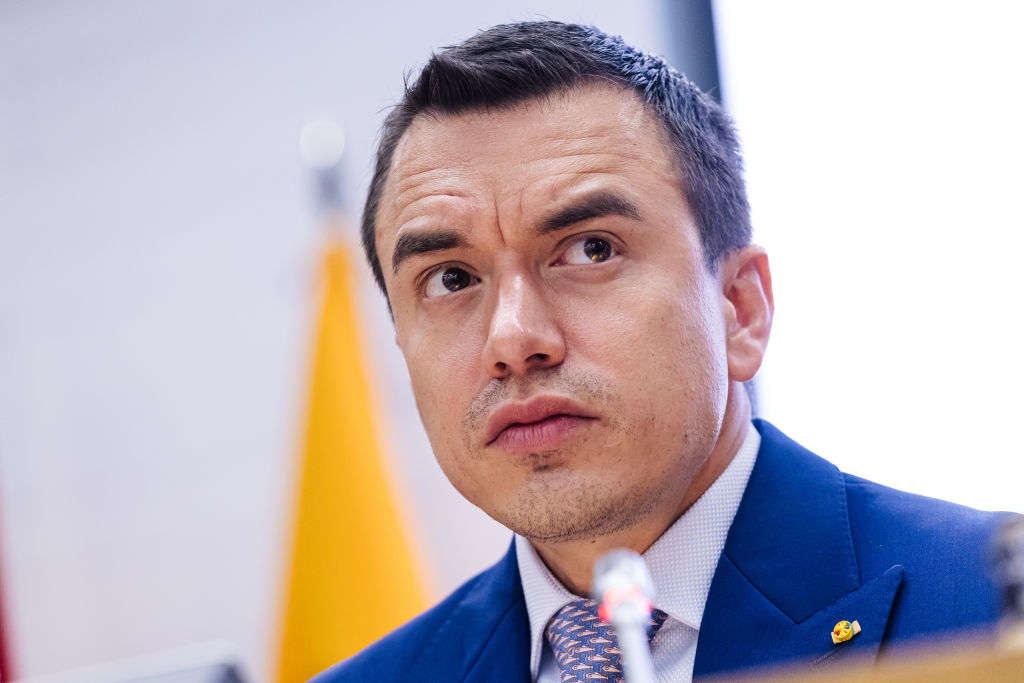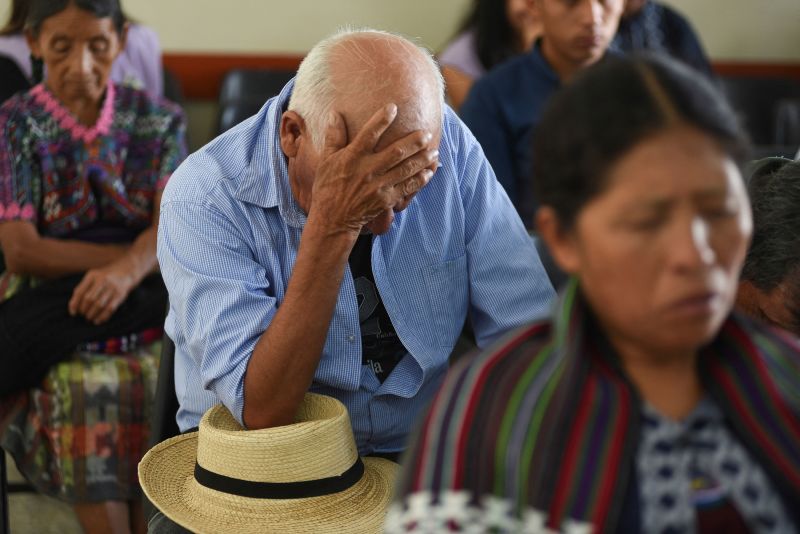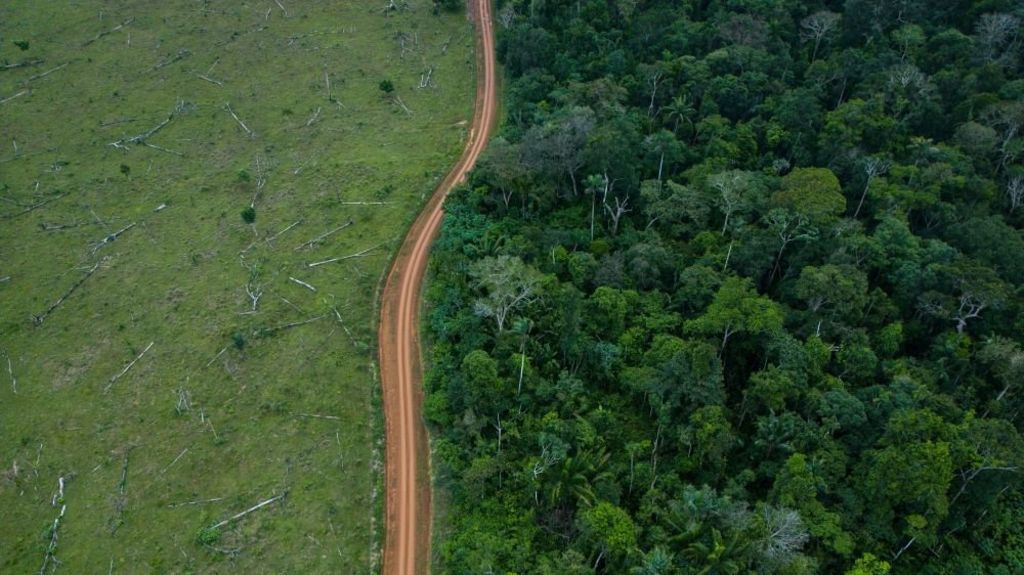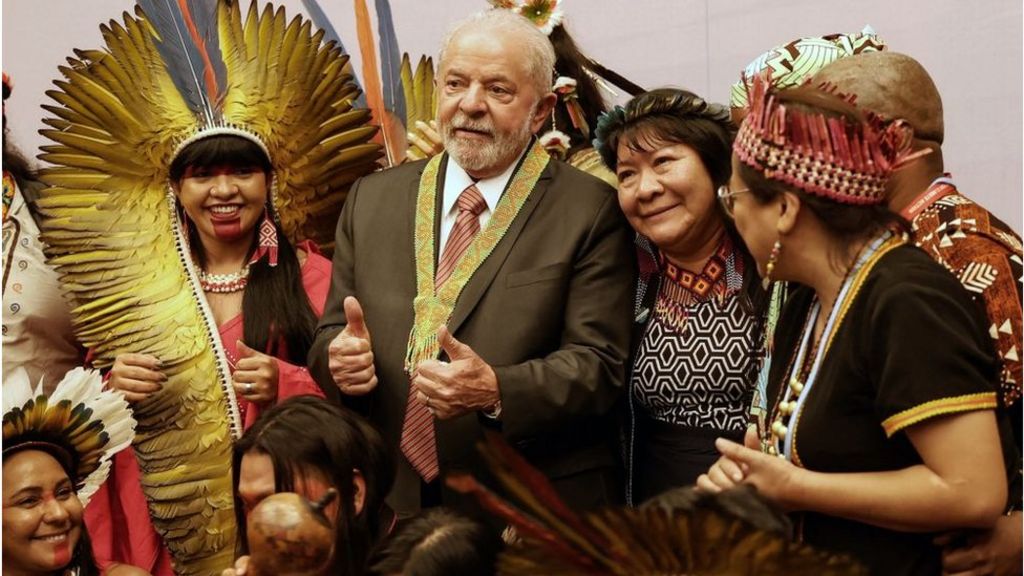Judi Lynn
Judi Lynn's JournalWalk Like A Mayan: Mexico's Most Incredible Pyramids
Story by Peter Moore • 2w

Pyramids but not as you know them
©J.Enrique Molina/Alamy Stock Photo
The pyramids of Mexico take the basic principles of the traditional structure and take it to the next level. Some are stepped. Others are covered in niches. Most are topped by temples. One, in Chichen Itza, was built so that the shadow of a giant serpent appears to be slithering up its staircase during equinoxes.
Click through the gallery to see these incredible feats of ancient engineering and learn the often extraordinary stories behind them…
https://www.msn.com/en-us/travel/news/walk-like-a-mayan-mexico-s-most-incredible-pyramids/ss-BB1kEk7b
(Click each photograph to see more information. )
Ecuador President Noboa Shuts Down Nation on Electricity Crisis
3 MINUTE READ

The President of the Republic of Ecuador, Daniel Noboa, speaks during a Spain-Ecuador business meeting in Madrid, Spain, on 25 Jan., 2024 .Carlos Lujan—Europa Press/Getty Images
BY STEPHAN KUEFFNER / BLOOMBERGAPRIL 17, 2024 10:42 PM EDT
Ecuador’s President Daniel Noboa ordered businesses and government offices to shut down Thursday and Friday amid a crippling lack of electrical power ahead of a key national referendum scheduled for Sunday.
Noboa blamed the unprecedented measure on drought, but also sabotage, without offering evidence. The energy crisis comes on the heels of a security crisis and a fiscal crisis that’s sent it seeking help from the International Monetary Fund.
“We’ve been hammered and hammered and hammered non-stop this week, they’ve tried to screw us with sabotage in the electric sector” to undermine support for his referendum, said Noboa, 36, in Atacames, a beach town hit hard by the surge in crime that’s made Ecuador one of Latin America’s most violent countries.
The market-friendly heir of a banana export fortune is asking voters in Sunday’s referendum to approve stronger use of the military as well as the extradition of Ecuadorian citizens to fight crime and to overturn constitutional bans on temporary work and international arbitration.
More:
https://time.com/6968360/ecuador-noboa-shutdown-electricity-crisis/


Daniel Noboa, President, and Álvaro Noboa, richest man in Ecuador and 5-time loser in Presidential elections.

Álvaro Noboa

Wikipedia, regarding father's human rights problems:
- snip -
Labour practices
Usleap once affirmed Noboa has opposed campaigns for workers' rights within his own companies, and Noboa Group workers have been illegally dismissed for joining trade unions.[19][20] In one 2002 incident striking workers at a Noboa subsidiary were attacked and–according to a Human Rights Watch report–several were shot by organized assailants.[21][22]
In 2002 the New York Times reported on working conditions in Álvaro Noboa's banana plantations in Ecuador. The article specifically mentioned the 3,000-acre (12 km2) plantation known as Los Álamos that employed about 1,300 people.[23] The workers of Los Álamos unionized in March 2002. Noboa's company responded by firing more than 120 of them. The article read: "When the workers occupied part of the hacienda, guards armed with shotguns, some wearing hoods, arrived at 2 a.m. on May 16, according to workers, and fired on some who had refused to move from the entrance gate, wounding two."
Noboa's Company, on the other hand, claims that the conflict was illegally initiated since the number of workers' with which the special committees were assembled never reached the number required by law, that is, a majority. They tried to fool authorities by having participants who were not workers. Both the workers' committee and the strike declaration were illegal.
It was said to the public and press that workers involved in this conflict were guilty of outrageous conduct at the farm, which motivated accusations brought forth before the authorities whereby the police had to intervene in order to safeguard company assets. The company told that conflict arose causing substantial losses due to unlawful stoppage of agricultural activity.[24]
Child labor
Noboa Group was also criticized in a HRW investigation into child labor practices in the banana industry.[25] In April 2002 Human Rights Watch released a report that "found that Ecuadorian children as young as eight work on banana plantations in hazardous conditions, while adult workers fear firing if they try to exercise their right to organize."[26]
More:
https://en.wikipedia.org/wiki/%C3%81lvaro_Noboa
Florida company cited over worker's heat death amid state's ban on heat illness prevention
APRIL 15, 2024 / 6:43 PM / UPDATED APRIL 15, 2024 AT 7:59 PM
By Chris Benson
April 15 (UPI) -- The Department of Labor on Monday said it cited a Florida company for its lack of preparedness to prevent heat-related illness after a heatstroke killed a 26-year-old worker from Mexico in September 2023.
McNeill Labor Management Inc. -- a company that provides contract laborers for agricultural markets throughout the United States -- was cited in the investigation by the federal Labor Department's Occupational Safety and Health Administration, which found that the unidentified Mexican national had died from heat-related injuries while working in an open sugar cane field.
An OSHA investigation found that he had experienced symptoms consistent with a heat-related illness and soon after collapsed.
The heat index reportedly had reached 97 degrees Fahrenheit in Palm Beach County, where the man, who was legally visiting the United States on the federal H-2A program for temporary or seasonal non-immigrant workers under a Biden administration pledge to "expand lawful pathways as an alternative to irregular migration," had later died.
. . .
Monday's OSHA announcement came days after Florida Gov. Ron DeSantis signed a bill that prevents local governments from enacting their own policies to protect outdoor workers in all 67 Florida counties. The state House Bill 433 signed by DeSantis -- which passed Florida's Senate in March 2024 and goes into effect July 1 -- restricts local government power by ensuring they are unable to force companies to "meet or provide heat exposure requirements beyond those required by law."
More:
https://www.upi.com/Top_News/US/2024/04/15/6201713212316/
(My bolding)
Behavioural responses to wealth taxation: Evidence from Colombia
Juliana Londoño-Vélez / 16 Apr 2024
Interest in wealth taxation has grown in recent years as a way to combat inequality and raise revenue, but evidence on the responses to wealth taxes has so far been sparse. This column exploits changes in Colombia’s wealth taxation regime to examine behavioural responses. Taxpayers promptly reduced their reported wealth to fall below higher tax brackets when faced with wealth tax increases, largely by misreporting assets that authorities cannot verify. They continued to report lower levels of wealth for years following the tax’s implementation. The wealth tax also led to increasing numbers of Colombians establishing offshore entities annually and wealthier Columbians shifting their assets to tax havens.
Interest in progressive wealth taxation has grown as a way to combat inequality and generate revenue, especially in the post-COVID-19 era (e.g. Czajka et al. 2021). Yet, there is no consensus on the effects of such taxation. Scholars views’ differ: some highlight enforcement challenges and potential tax evasion (e.g. Bastani and Waldenström 2024), while others emphasise enduring impacts on wealth distribution and government revenue due to wealth accumulation dynamics (Jakobsen et al. 2020, Saez and Zucman 2019).
In a recent paper (Londoño-Vélez and Avila-Mahecha 2024), my co-author and I help fill this gap by estimating behavioural responses to wealth taxation in Colombia. We use extensive administrative tax microdata and leverage cross-sectional and time variation in individuals’ exposure to the wealth tax. Colombia featured average wealth tax rates and discrete notches at certain wealth thresholds. For instance, a taxpayer reporting slightly below 1 billion pesos in 2010 ($520,830) owed no tax, but an additional peso led to a 1% tax on all taxable wealth. Significant policy changes in four separate years, including tax duration, exemption thresholds, and rate schedules, create substantial identifying variation and provide one of the world’s largest wealth tax policy experiments.
Bunching below wealth tax brackets
Figure 1 compares individuals’ wealth holdings before and after Colombia’s temporary wealth tax. Taxpayers promptly reduce their reported wealth to fall below higher tax brackets when faced with wealth tax increases. A 1% increase in (one minus) the wealth tax rate leads to an immediate 2% rise in reported wealth for the marginal buncher, with one-fifth of revenue lost due to taxpayers’ instant response.
More:
https://cepr.org/voxeu/columns/behavioural-responses-wealth-taxation-evidence-colombia
Massive genocide trial reopens old wounds in Guatemala, 40 years after indigenous slaughter
By Tara John and Ivonne Valdés, CNN and CNN en Español
8 minute read
Published 1:02 PM EDT, Sat April 13, 2024

Ixil indigenous authorities attend a hearing where survivors of the civil war testify in the Ixil Genocide trial at the Supreme Court, in Guatemala City, Guatemala April 8, 2024. Cristina Chiquin/Reuters
CNN
—
Juan Brito López was in his mid-20s when soldiers rushed into his home in the village of Pexla, nestled in Guatemala’s western highlands. He escaped, hiding in the wilderness, but could not save his wife and four daughters.
. . .
The former laborer, who sometimes broke into tears during his testimony, spoke in front of a large screen broadcasting Lucas García’s impassive figure. Lucas García participated in the proceedings via video link from a military hospital.
The retired general has been indicted for genocide, crimes against humanity, forced disappearances, and sexual violence against the Maya Ixil people, according to the organization representing the victims, the Association for Justice and Reconciliation (AJR).
AJR accuses him of ordering more than 30 massacres and destroying 23 villages in the Maya Ixil region, causing the death of at least 1,771 people when he led the army between 1981 and 1982 – during the tenure of his brother President Fernando Romeo Lucas García.
More:
https://edition.cnn.com/2024/04/13/americas/guatemala-genocide-trial-maya-ixil-indigenous-intl-latam/index.html
Neolithic women in Europe were tied up and buried alive in ritual sacrifices, study suggests
By Tom Metcalfe published 2 hours ago
The research found evidence of the "incaprettamento" method of murder at 14 Neolithic sites in Europe.
The murder of sacrificial victims by "incaprettamento" — tying their neck to their legs bent behind their back, so that they effectively strangled themselves — seems to have been a tradition across much of Neolithic Europe, with a new study identifying more than a dozen such murders over more than 2,000 years.
The study comes after a reassessment of an ancient tomb that was discovered more than 20 years ago at Saint-Paul-Trois-Châteaux near Avignon, in southern France. The tomb mimics a silo, or pit where grain was stored, and it held the remains of three women who were buried there about 5,500 years ago.
The new study, published Wednesday (April 10) in the journal Science Advances, reinterprets the positions of two of the skeletons and suggests the individuals were deliberately killed — first by tying them up in the manner called "incaprettamento" and then by burying them while they were still alive, perhaps for an agricultural ritual.
Study senior author Eric Crubézy, a biological anthropologist at Paul Sabatier University in Toulouse, France, told Live Science that there was a lot of agricultural symbolism to the tomb. He noted that a wooden structure built over it was aligned with the sun at the solstices and that several broken stones for grinding grain were found nearby. "You have the alignment, you have the silo, you have the broken stones — so it seems that it was a rite related to agriculture."
More:
https://www.livescience.com/archaeology/neolithic-women-in-europe-were-tied-up-and-buried-alive-in-ritual-sacrifices-study-suggests
"Bukele must be investigated for torture under the state of exception"
Monday, April 8, 2024
José Luis Sanz
Leer en español
Over the last weekend in March, 2022, a secret pact between the administration of Nayib Bukele and the gangs of El Salvador violently fell apart. In the ensuing 72 hours, the MS-13 gang assassinated 87 people. The Legislative Assembly, at Bukele’s order, responded by decreeing a state of exception giving extraordinary powers to the Police and suspending procedural guarantees and constitutional rights such as freedom of association and the right to private communications. These measures, which the law prescribes to last for a month, have been extended 24 times and are still in place. In two years, at least 78,175 people have been detained and incarcerated, at times for the mere reason of appearing nervous to a police officer. Today, 2.46 percent of the Salvadoran adult population is in prison.
Juanita Goebertus, director for the Americas at Human Rights Watch (HRW), accuses the Salvadoran government of failing to guarantee liberties and human rights in its security policy: “Hundreds of people continue waiting for something as basic as knowing why a family member was arrested,” she denounces in this interview, and insists that there is documented proof of the “direct participation of guards in acts of torture.” President Bukele, she says, should one day be investigated “for his responsibility in having incited this type of conduct.”
Goebertus, a lawyer and political scientist by training, has worked for 20 years in conflict resolution. She was a human rights and transitional justice advisor to the Ministry of Defense and National Security Council of Colombia during the administrations of Álvaro Uribe and Juan Manuel Santos, and was part of the negotiating team of the peace accord with the FARC guerrillas. She was also a legislator with the Alianza Verde (Green Alliance) party before joining HRW in 2022. In her new position, she warns of a general backsliding on human rights in Central America and rising authoritarianism, “whether in its most dictatorial form, in Nicaragua, or in its most innovative version in El Salvador”.
Under the Bukele administration, she says, not even the number of detained people or the homicide statistics are verifiable and transparent, and “no citizen today is able to defend their rights from a possible attack by a public official.”
In this interview, given from Bogotá, Goebertus also references the state persecution and exile of human rights defenders, prosecutors, and journalists in the Central American isthmus: “The greatest obstacle for these regimes, what most bothers them, is an active, deliberative, critical civil society,” she says. The response, she adds, especially in contexts like El Salvador, where most of society seems to accept the loss of liberties with a mixture of normalization and resignation, should be to “resist” and win the “narrative fight” against authoritarianism by demonstrating “that human rights are not only for a privileged few.”
More:
https://elfaro.net/en/202404/el_salvador/27302/bukele-must-be-investigated-for-torture-under-the-state-of-exception
History offers Argentina a cautionary tale on dollarisation
Estimated reading time: 5 minutes
Bert van Stiphout-Kramer
Petros Milionis
April 10th, 2024
Argentina’s president, Javier Milei, has promised to dollarise the economy and eliminate the central bank to deal with the country’s fiscal crisis and runaway inflation. Bert van Stiphout-Kramer and Petros Milionis look at the theoretical and historical difficulties of transitioning to a rigid monetary regime and recommend careful consideration of both its economic and political implications before any decision is made.
The recent presidential election in Argentina and the unexpected victory of libertarian economist Javier Milei have generated renewed interest in the country’s economic malaise. Argentina has been dealing with soaring inflation rates and an unabating fiscal crisis for several years. Milei has promised to tackle both with a series of radical reforms.
Most prominent among these is a proposal to dismantle the country’s central bank and to replace the Argentinian peso with the US dollar. He claims that doing so will eliminate the ability of the government to monetise fiscal deficits and put an end to triple-digit inflation rates. These claims invoke the experiences of Ecuador, El Salvador and Panama, all of which have already dollarised. Given the much larger size of the Argentinian economy, though, this raises the questions how likely the prospects of an Argentinian dollarisation are and how viable this policy will prove. On these two questions the monetary history of Argentina provides a cautionary tale.
Among all radical economic ideas proposed by Milei during his election campaign, the dollarisation policy generated the most discussion and debate among Argentinians as well as foreign commentators. In a televised debate before the second round of the presidential election, this policy was one of the first lines of attack by his opponent, Sergio Massa, and one of the policy proposals that Milei was most eager to defend. Among libertarian economists the dollarisation policy has been lauded as a bold and effective move to bring down inflation. More left-leaning economists, however, have dismissed it as an ineffective and potentially risky policy choice, which could hurt the more vulnerable socio-economic classes.
Leaving aside questions about the effectiveness of the policy in the long run, some scholars have also raised doubts about the ability of the government to manage the transition process. A key problem would be the lack of dollar reserves by the central bank, which may further fuel inflation before and immediately after a decision to dollarise the economy. Moreover, the introduction of a foreign currency as legal tender implies the end of independent monetary policy, and the closure of the central bank implies the loss of a lender of last resort. This will severely limit the ability of the Argentinian government to weather macroeconomic shocks and is expected to have a negative impact on economic growth.
More:
https://blogs.lse.ac.uk/businessreview/2024/04/10/history-offers-argentina-a-cautionary-tale-on-dollarisation/
Colombia's Ex-President Uribe Set for Historic Trial on Witness Tampering Charges
By Sathish Raman
| Updated: Wednesday, April 10, 2024, 1:54 [IST]
In a significant development from Colombia, the prosecutor's office announced on Tuesday its decision to call former President Álvaro Uribe to trial. Uribe faces charges of bribery of witnesses in criminal proceedings and procedural fraud. This marks a historic moment as Uribe could become the first former president of the Andean country to stand trial for such allegations. The decision underscores a pivotal shift in the criminal process against Uribe, especially with the appointment of a new attorney general in March.
Previously, attempts were made by prosecutors under the former administration to close the case against Uribe, citing a lack of "criminal responsibility of the defendant." However, these requests were turned down by criminal judges. The prosecution is now poised to formalize the accusation against Uribe at an upcoming hearing, the date of which remains undecided. Should Uribe be found guilty of procedural fraud, he could be looking at up to eight years behind bars. Moreover, the charge of bribing witnesses could carry a sentence of up to twelve years in prison.
The case against Uribe stems from accusations he made over a decade ago against an opposition senator. Uribe alleged that the senator was attempting to enlist paramilitaries to testify against him and link him to the formation of a paramilitary group. Contrary to prosecuting the senator, a high court initiated a criminal file against Uribe to investigate if he had indeed attempted to manipulate witnesses against his adversary.
Uribe, who led Colombia from 2002 to 2010, found himself under house arrest for two months in 2020 in connection with this case. Throughout the proceedings, he has consistently proclaimed his innocence. The upcoming trial not only puts Uribe's legacy under scrutiny but also highlights the ongoing challenges within Colombia's judicial and political landscape.
https://www.oneindia.com/international/colombian-ex-president-uribe-trial-witness-tampering-011-3795895.html
~ ~ ~




Very pedestrian picture of Bush & Uribe strolling around Bush's Texas ranch.

W. bestows the National Medal Freedom Award upon Uribe.

Climate change: Logging decline after political change in Brazil, Colombia
2 days ago
By Matt McGrath,
Environment correspondent

Observers say government action in Colombia has led to a reduction in primary forest loss
The number of trees lost in tropical forests in Brazil and Colombia fell dramatically last year because of political action, a new analysis finds.
Researchers say new leaders have prioritised the environment, with tree losses in the Brazilian Amazon down by a huge 39%.
. . .

The return to government of President Lula has coincided with a dramatic drop in forest losses in Brazil
In 2023, the tropics saw 3.7 million hectares of forest lost - equivalent to 10 football fields per minute, a slight decline on last year. These losses would have been far higher if it wasn't for Brazil and Colombia.
According to this new analysis, political action in both countries has had a significant impact on tree felling.
President Luiz Inacio Lula da Silva came to power in Brazil last year promising to tackle tree losses and end deforestation by 2030.
As a result, there has been a 36% drop in primary forest losses in Brazil in 2023, compared to 2022.
"I think what we're seeing in Brazil, for example, is really a case of putting law enforcement back in place that was dismantled during the previous government," said Rod Taylor from WRI.
Given that Brazil was responsible for 43% of all tropical forest loss in 2022, this reduction is significant.
More:
https://www.bbc.com/news/science-environment-68716874
(What a shock, learning progressive leaders protect the interests of the people, rather than the 1%!)
Profile Information
Member since: 2002Number of posts: 160,525